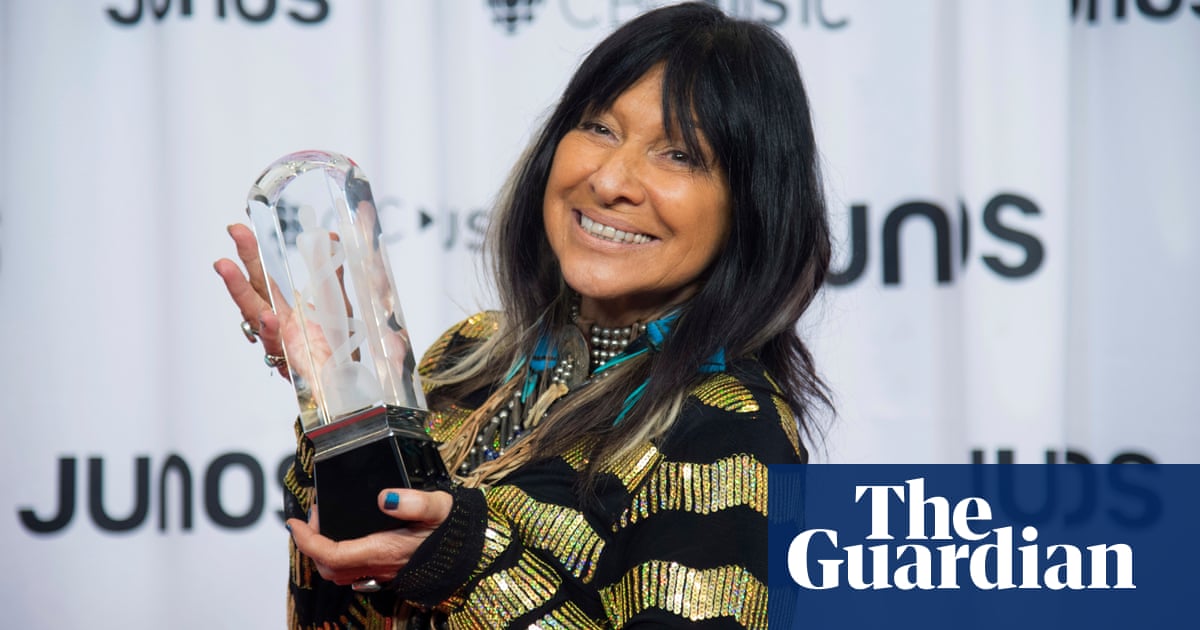
Accusations in a film that renowned American folk artist Buffy Sainte-Marie falsely portrayed her Native heritage have caused concern among First Nations groups in Canada, the country she states as her birthplace. This brings attention to the intricate impact of an artist who has spent her career advocating for Indigenous rights.
Sainte-Marie identifies as a “Cree musician and songwriter” and has always connected her origins to the Piapot First Nation reserve in Saskatchewan. She asserts that she was born in 1941 but was removed from her biological mother as a baby and brought up by a white family in the United States.
However, the Canadian Broadcasting Corporation recently aired a documentary that challenges this story and her assertions of having Indigenous ancestry.
The findings of the report were met with shock and could harm the image of Sainte-Marie, who is known as a cultural figure and a strong advocate for social justice throughout her successful career. She has received an Academy Award, multiple industry recognitions, and four honorary degrees from Canadian universities.
Delia Opekokew, Sainte-Marie’s former lawyer, who is Cree, has disputed the claims and recently signed an affidavit that concludes Sainte-Marie was probably born in Saskatchewan in a private home and soon after was given up for adoption to an American family visiting the area.
“In the 1960s, as a Native American woman, I attempted to carry myself with confidence. However, we encountered numerous instances of discrimination and sexism. This led me to keep a low profile. But when I was introduced to Buffy’s music, it filled my heart with happiness. I couldn’t help but cry,” she recounted. “Her songs were deeply sincere and showed reverence towards the Indigenous community. It gave me a sense of self-worth. As a result, I held my head up high.”
In order to support her research, Opekokew, the first Indigenous woman to be accepted into the bar in Ontario and Saskatchewan, conducted numerous interviews in both Cree and English over twenty years ago. This included interviews with Emile and Clara Piapot, the couple who legally adopted Sainte-Marie into their family as an adult according to Cree traditions.
I also had a conversation with Noel Starblanket, the ex-leader of the National Indian Brotherhood, which eventually transformed into the Assembly of First Nations. According to her, Starblanket’s version of events is supported by other individuals she has talked to.
She denounced the CBC’s “intrusive reporting” which she believed neglected the significance of oral history and Cree customs.
“I was not approached by the CBC as the witness for the oral history. I consulted with the elders and emphasized the significance of oral history, which is just as crucial as written records. In Indigenous history, it holds even greater importance. The lack of respect shown for our methods of preserving our history is disheartening,” she stated. “I feel terrible about the situation, both for Buffy and for the community members who stand by her.”
Sainte-Marie responded in a written statement, stating that she has always had difficulty answering questions about her identity. In the past, she had even instructed her lawyer to gather information about her background. She shared that her “growing-up mother” had disclosed various things to her, such as being adopted and being of Native descent. However, due to the lack of documentation that was common for Indigenous children born in the 1940s, she was not able to confirm these details. Nevertheless, she confidently stated, “I may not know where I was born, but I know who I am.”
The claims made by CBC, such as a birth certificate from Massachusetts for Sainte-Marie and statements on social media from her son, have sparked a wave of hateful comments.
Ntawnis Piapot, whose grandparents adopted Sainte-Marie according to Cree customs, expressed on Facebook that the report has caused “shameful” repercussions for her aunt and their family. She states that her relatives are experiencing “pain and suffering” as a result.
Opekokew, who was removed from her family to attend a residential school, believes that the broadcaster should have taken into account the significant impact the reporting could have on others who were also separated from their families and survivors of sexual abuse.
“You can’t tell those kinds of stories without considering the potential impact it may have on others. As expected, it caused a strong reaction from thousands of people, including myself.”
The Canadian Broadcasting Corporation (CBC) had previously stated its guidelines for reporting on “pretendian” narratives. It attempted to contact members of the Piapot family, but did not receive a response. The CBC also tried to arrange a visit to the Piapot First Nation with the acting chief, but the chief declined. The broadcaster acknowledges that the Piapot family did adopt Buffy Sainte-Marie as an adult and recognizes the legitimacy of this traditional adoption.
During the weekend, the Indigenous Women’s Collective released a statement stating that after carefully considering the accusations against Sainte-Marie, they determined that the singer had participated in a “significant deceit” that allowed her to gain from a purposely misleading and untrue story, which misled numerous Indigenous individuals, including youth, adults, and most notably, survivors of colonial trauma.
The group focused on Sainte-Marie’s past remarks about being a survivor of the Sixties Scoop, a well-known period in Canadian history when Indigenous children were forcibly removed from their families and placed with white families. Although the Scoop occurred after Sainte-Marie’s birth, adoptions into white families still occurred.
The group known as the Indigenous Women’s Collective has urged for Sainte-Marie to have her 2018 Juno Award for Indigenous Album of the Year revoked. This award is highly esteemed in the Canadian music industry.
However, some argue that the history and career of Sainte-Marie demonstrate the intricate and convoluted nature of identity. According to Kim Wheeler, a writer from Manitoba who recently collaborated on a musical tribute to Sainte-Marie, the Juno award category for Indigenous artist of the year is largely attributed to the singer’s groundbreaking career.
She mentioned that Buffy was a huge inspiration for many of the performers at the show, acting as their guiding light. They shared that without her, they may not have chosen to pursue music careers. Buffy proved to them that if she could achieve success, they could too.
Wheeler, who has Anishinaabe and Mohawk heritage, expresses that Sainte-Marie’s role on Sesame Street had a significant impact on them as a child. “Seeing her on the show, we were reminded that we are capable of more than what society expects of us.”
Wheeler states that Sainte-Marie strived to incorporate Indigenous peoples in casting choices and provide them with opportunities that had been previously withheld. Wheeler also questions the broadcaster’s choice to proceed with the documentary, noting its divisive impact on Indigenous communities.
According to Wheeler, individuals will need time to determine whether they will dismiss her entire legacy or continue to view her as a heroic figure. People are discussing the various stages of grief and experiencing emotions such as anger, pain, and denial. Will we all eventually reach a state of acceptance? It is uncertain, as the situation is complex.
Source: theguardian.com


